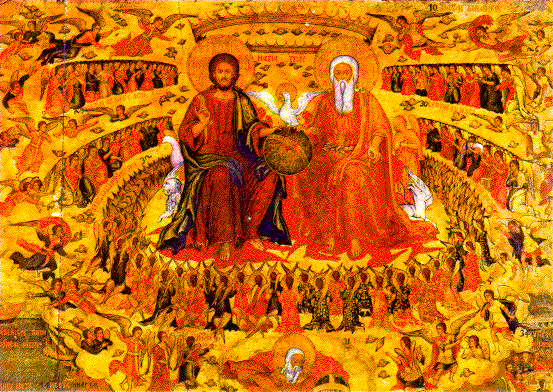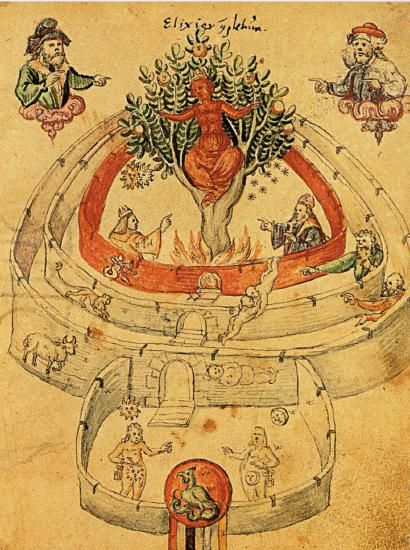It looks like you're using an Ad Blocker.
Please white-list or disable AboveTopSecret.com in your ad-blocking tool.
Thank you.
Some features of ATS will be disabled while you continue to use an ad-blocker.
share:
It originally comes from the Greek word μύω or " muo," which scholar Karen Armstrong defines as "to close".
Now my question is: what is being closed? I find this a very interesting word choice because so often people speak of the mystical experience as a kind of "metaphysical opening up" or "expansion."
Yet here we have the opposite expression.
I propose the mystical experience can be conceived as either a "total opening" of awareness or a "total closing" of normal awareness...a s the Tao Te Ching puts it from the latter perspective:
"Darkness within darkness: the gateway to all mystery."
Then there is mystical experience as derived from "quietist" traditions like Zen restriction of consciousness to the breath... This is a kind of radical "closure" of experience to attain the mystical ultimate.
Mysticism through ecstatic abandonment and radical "opening up";. Mysticism through plunging into the "inner void": the "nothingness" inside: radical "closing down" and restriction.
Two opposite paths to the same place? Or two different places all together? Close down, open up: same thing or vitally different?
Now my question is: what is being closed? I find this a very interesting word choice because so often people speak of the mystical experience as a kind of "metaphysical opening up" or "expansion."
Yet here we have the opposite expression.
I propose the mystical experience can be conceived as either a "total opening" of awareness or a "total closing" of normal awareness...a s the Tao Te Ching puts it from the latter perspective:
"Darkness within darkness: the gateway to all mystery."
Then there is mystical experience as derived from "quietist" traditions like Zen restriction of consciousness to the breath... This is a kind of radical "closure" of experience to attain the mystical ultimate.
Mysticism through ecstatic abandonment and radical "opening up";. Mysticism through plunging into the "inner void": the "nothingness" inside: radical "closing down" and restriction.
Two opposite paths to the same place? Or two different places all together? Close down, open up: same thing or vitally different?
myster-, myst-
(Greek > Latin: secret, occult [probable literal meaning is "one whose eyes are closed"])
-MM
edit on 9-11-2020 by MerkabaMeditation because: (no reason given)
a reply to: MerkabaMeditation
Thank you for the input.
"One whose eyes are closed" sounds a bit pejorative (though it doesn't have to be read as such, of course). I wonder if the term was originally applied that way.
Thank you for the input.
"One whose eyes are closed" sounds a bit pejorative (though it doesn't have to be read as such, of course). I wonder if the term was originally applied that way.
a reply to: Never Despise
The verb μυω (muo) and its future form μυσω (muso) predominantly means to shut (of eyes or the mouth), but with the secondary meaning of to cover, to hide or to be just under the surface.
μυω | Abarim Publications Theological Dictionary (New Testament Greek)
www.abarim-publications.com...
The verb μυω (muo) and its future form μυσω (muso) predominantly means to shut (of eyes or the mouth), but with the secondary meaning of to cover, to hide or to be just under the surface.
μυω | Abarim Publications Theological Dictionary (New Testament Greek)
www.abarim-publications.com...
a reply to: Never Despise
Who knows, to take a somewhat related example of how difficult it is to trace back etymology; there are theories that "Black magic" actually refers to magic from Ancient Egypt. The 'black land' was the fertile land on the banks of the Nile, and the ancient Egyptians used this land for growing their crops.
I guess that someone that sits and meditates "shuts his/her eyes", and that may be the possible origin? Just guessing here. "Opening" may of course be the opening of the third eye - but you have probably already looked into that.
-MM
Who knows, to take a somewhat related example of how difficult it is to trace back etymology; there are theories that "Black magic" actually refers to magic from Ancient Egypt. The 'black land' was the fertile land on the banks of the Nile, and the ancient Egyptians used this land for growing their crops.
I guess that someone that sits and meditates "shuts his/her eyes", and that may be the possible origin? Just guessing here. "Opening" may of course be the opening of the third eye - but you have probably already looked into that.
-MM
edit on 9-11-2020 by MerkabaMeditation because: (no reason given)
a reply to: Never Despise
Awareness can't open or close.
Awareness is full of whatever is here.
Awareness does not appear to be seen or heard......it is what is seeing and hearing.
Maybe awareness is what is hiding (in the plain sight).
Awareness can't open or close.
Awareness is full of whatever is here.
Awareness does not appear to be seen or heard......it is what is seeing and hearing.
Maybe awareness is what is hiding (in the plain sight).
a reply to: Itisnowagain
Words are expedients. Words like "awareness" are so broad in meaning that they can be used in many ways.
Perhaps awareness cannot be fully "opened or closed." But mystical experiences can come through "expansion" or "contraction" of a quality I termed "awareness" but could just as easily have been called consciousness, perception, etc.
Example: a mystical experience can be induced by sensory deprivation. A mystical experience can also be induced through sensory overload.
Words are expedients. Words like "awareness" are so broad in meaning that they can be used in many ways.
Perhaps awareness cannot be fully "opened or closed." But mystical experiences can come through "expansion" or "contraction" of a quality I termed "awareness" but could just as easily have been called consciousness, perception, etc.
Example: a mystical experience can be induced by sensory deprivation. A mystical experience can also be induced through sensory overload.
a reply to: Never Despise
You believe that you are a separate thing (a person)........but really you are what is aware of what is occuring.
Are you aware?
It can be noticed that thought happens.....the assumption is that there is a thinker of thought......but there is no you inside doing thought.
You believe that you are a separate thing (a person)........but really you are what is aware of what is occuring.
Are you aware?
It can be noticed that thought happens.....the assumption is that there is a thinker of thought......but there is no you inside doing thought.
a reply to: Itisnowagain
You would really like Yogacara Buddhism I think, although you are probably already aware of it. If not, I posted some links in your other recent thread.
You would really like Yogacara Buddhism I think, although you are probably already aware of it. If not, I posted some links in your other recent thread.
a reply to: Never Despise
Yes...I read some of the link.
You would really like the Open Doorway link I posted on the other thread.
Yes...I read some of the link.
You would really like the Open Doorway link I posted on the other thread.
a reply to: Itisnowagain
Thanks I will watch it when I have a little more bandwidth at my disposal. Appreciated.
Thanks I will watch it when I have a little more bandwidth at my disposal. Appreciated.
a reply to: Never Despise
Don't worry about watching the vid......click the open doorway link and read his webpage.
However.....the video does speak about the 'mystery'.
Because there is a belief in objects.....the mystery stays hidden.
Don't worry about watching the vid......click the open doorway link and read his webpage.
However.....the video does speak about the 'mystery'.
Because there is a belief in objects.....the mystery stays hidden.
edit on 9-11-2020 by Itisnowagain because: (no reason given)
a reply to: Never Despise
closing the eyes that see illusions, and opening the third eye to see reality
closing the eyes that see illusions, and opening the third eye to see reality
edit on 9-11-2020 by sapien82 because: (no reason
given)
Interesting theological terms:
Kenotic Mysticism: Mysticism that relies on the "emptying of the self.
Cataphatic Mysticism: Mysticism that describes the ultimate in terms of what it is rather than what it is not, as in ecstatic devotionalism.
Kenotic Mysticism: Mysticism that relies on the "emptying of the self.
Cataphatic Mysticism: Mysticism that describes the ultimate in terms of what it is rather than what it is not, as in ecstatic devotionalism.
originally posted by: Never Despise
Interesting theological terms:
Kenotic Mysticism: Mysticism that relies on the "emptying of the self.
Cataphatic Mysticism: Mysticism that describes the ultimate in terms of what it is rather than what it is not, as in ecstatic devotionalism.
Reminds of how when it comes to meditation, and seeing some recommendations to not involve religious studies with the practice for reasons that never went into details why.
Kind of how in Feng Shui says the position of a thinker, is so not so Feng Shui cause it restricts the flow of chi or what not.
The meaning of Apocalypse an Revelations basically mean the samething, which is "to unveil/reveal."
edit on 9-11-2020 by Specimen88 because: (no reason given)
a reply to: Specimen88
You can see the full spectrum from kenotic to cataphatic in Buddhism. On one extreme consider the "emptiness," "no-mind," "just-sitting" and minimalist aesthetics of Zen:

On the other extreme is Tibetan Vajrayana, with its thousands of many-limbed beings and otherworldly mandalas to be contemplated, lengthy esoteric mantras to be chanted, high-level analytic philosophy to be debated, and "maximalist" aesthetics:

Both are reaching for the same place but coming at it from almost opposite directions...
You can see the full spectrum from kenotic to cataphatic in Buddhism. On one extreme consider the "emptiness," "no-mind," "just-sitting" and minimalist aesthetics of Zen:

On the other extreme is Tibetan Vajrayana, with its thousands of many-limbed beings and otherworldly mandalas to be contemplated, lengthy esoteric mantras to be chanted, high-level analytic philosophy to be debated, and "maximalist" aesthetics:

Both are reaching for the same place but coming at it from almost opposite directions...
edit on 9-11-2020 by Never Despise because: (no reason given)
a reply to: Never Despise
Yin an yang, or ebb an flow, which one came first, no body will know. The spiral a very commonly used symbol in a wide variety of differing cultures, like the Celts or Japanese.
Heck, even a Swastikas is depicted as such, while widely accepted as symbol of flow of Life or Peace, accross the globe rather then just Nazis. It was even a symbol for the Greek God Zeus in some form, an the Golden Ratio depicts a spiral most of the time too.
The Tibetan picture very similar to even some western christian/gnostic artworks.



No idea what they are trying to capture though, maybe what the inside of one head looks like, an what goes on up there? Your Tibetan picture even has that tunneling visual effect as well.
Yin an yang, or ebb an flow, which one came first, no body will know. The spiral a very commonly used symbol in a wide variety of differing cultures, like the Celts or Japanese.
Heck, even a Swastikas is depicted as such, while widely accepted as symbol of flow of Life or Peace, accross the globe rather then just Nazis. It was even a symbol for the Greek God Zeus in some form, an the Golden Ratio depicts a spiral most of the time too.
The Tibetan picture very similar to even some western christian/gnostic artworks.



No idea what they are trying to capture though, maybe what the inside of one head looks like, an what goes on up there? Your Tibetan picture even has that tunneling visual effect as well.
edit on 9-11-2020 by Specimen88 because: (no reason given)
edit on 9-11-2020 by Specimen88 because: (no reason
given)
edit on 9-11-2020 by Specimen88 because: (no reason given)
originally posted by: Never Despise
a reply to: Itisnowagain
Words are expedients. Words like "awareness" are so broad in meaning that they can be used in many ways.
Perhaps awareness cannot be fully "opened or closed." But mystical experiences can come through "expansion" or "contraction" of a quality I termed "awareness" but could just as easily have been called consciousness, perception, etc.
Example: a mystical experience can be induced by sensory deprivation. A mystical experience can also be induced through sensory overload.
What is actually occuring is the mystery.
This appears to be happening but where is it happening?.....how is it happening?
Notice how thought appears and dissolves at the same instant.
What is thought made of? Where did it come from and where does it go?
The idea that you are the thinker of thought is simply a thought!!
What are you?
Are you?
a reply to: Never Despise
If you're going to go back to original meanings, which is a good thing in itself, you need to pay attention to the scholars of language.
The largest Greek lexicon on my bookshelves defines MYSTERION as "a hidden thing, secret, mystery". Hence, in the plural, "mysteries, religious secrets".
So it seems that a mystery is "closed off", in the sense of being "shut away", concealed from the knowledge of most people.
If you're going to go back to original meanings, which is a good thing in itself, you need to pay attention to the scholars of language.
The largest Greek lexicon on my bookshelves defines MYSTERION as "a hidden thing, secret, mystery". Hence, in the plural, "mysteries, religious secrets".
So it seems that a mystery is "closed off", in the sense of being "shut away", concealed from the knowledge of most people.
edit on 15-11-2020 by DISRAELI because: (no reason given)
originally posted by: DISRAELI
a reply to: Never Despise
If you're going to go back to original meanings, which is a good thing in itself, you need to pay attention to the scholars of language.
The largest Greek lexicon on my bookshelves defines MYSTERION as "a hidden thing, secret, mystery". Hence, in the plural, "mysteries, religious secrets".
So it seems that a mystery is "closed off", in the sense of being "shut away", concealed from the knowledge of most people.
What actually is, is hidden by the belief in something else.
The mind imagines the past and future in the hope that it can make itself secure.......it fears death.
The truth is hiding in plain sight.
If the truth was seen then you as a separate thing would die!!
Nothing but an illusion would die
There is only what is happening....and what is happening is the mystery.
edit on 15-11-2020 by Itisnowagain because: (no reason given)
new topics
-
Bizarre Labour Party Tic Toc Video Becomes Even More Embarrassing
Regional Politics: 6 hours ago
top topics
-
The elephant in the room (wearing a hoodie)
US Political Madness: 14 hours ago, 14 flags -
Dr. Demento
Music: 14 hours ago, 6 flags -
Bizarre Labour Party Tic Toc Video Becomes Even More Embarrassing
Regional Politics: 6 hours ago, 4 flags -
Potter to WHU
World Sports: 12 hours ago, 2 flags
active topics
-
Its Looking Like Schiff - Vindman - Ciaramella Conspired to Impeach President Trump.
Political Conspiracies • 188 • : WeMustCare -
Judge rules president-elect Donald Trump must be sentenced in 'hush money' trial
US Political Madness • 68 • : xuenchen -
Statements of Intent from Incoming Trump Administration Members - 2025 to 2029.
2024 Elections • 60 • : WeMustCare -
Los Angeles brush fires latest: 2 blazes threaten structures, prompt evacuations
Mainstream News • 266 • : xuenchen -
Trump's idea to make Canada the 51st US state: 'Potential is massive'
Mainstream News • 155 • : DaydreamerX -
Gravitic Propulsion--What IF the US and China Really Have it?
General Conspiracies • 38 • : DaydreamerX -
What Is 'Quad Demic'? Mask Mandate Returns In These US States
Diseases and Pandemics • 45 • : Scratchpost -
Encouraging News Media to be MAGA-PAF Should Be a Top Priority for Trump Admin 2025-2029.
Education and Media • 93 • : WeMustCare -
Advice for any young Adult .
General Chit Chat • 18 • : Cre8chaos79 -
Paramilitary Leaks - John Williams
Whistle Blowers and Leaked Documents • 13 • : Boomer1947
